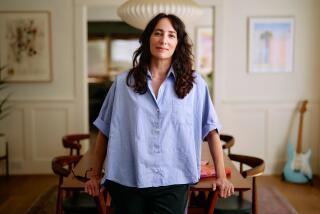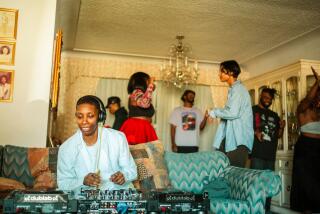CRENSHAW : Talk Show Bridges Black Cultures
- Share via
It began, said Elizabeth Yiaba, with the desire to bridge the gap she saw between black people on both sides of the Atlantic.
Africans and African Americans, for all of their rich common history, knew precious little about their very different cultures. The misperceptions and ignorance, Yiaba said, were ensuring that the twain had little chance of ever meeting.
So Yiaba, a 30-year-old Sierra Leone native, launched a cable-TV talk show on Christmas Day, 1992, called “The Chesima Series.”
“The word chesima means ‘Tell the people the truth’ or ‘Transmit the facts’ in my language, Kono,” Yiaba said at her Crenshaw Boulevard boutique opposite the Baldwin Hills Crenshaw Plaza. “And the fact is: We--Africans and African Americans--have a lot more in common than we think. I created ‘The Chesima Series’ to show people that.”
The hourlong show is broadcast at 8:30 p.m. Fridays on South Central Community Television, Continental Cablevision’s community programming channel. On a vibrant set decorated with African fabrics and furniture, Yiaba and three or four guests discuss topics from both the African and African American perspectives: relationships, business, the black male crisis in America, health, beauty and coping with stress, among other things.
Dressed in traditional West African garb, Yiaba moderates the discussion among guests who seem very different on the surface.
A recent show on stress management brought together Georgianna Williams, the mother of Damian Williams, a defendant in the Reginald Denny trial, and Kwame Boateng, a Ghanaian native who, last year, became the first African to run for Los Angeles mayor. Another session on polygamy--part of some African traditions--versus monogamy generated plenty of sparks when a Muslim, a Nigerian polygamist and two staunch American Christians argued their points.
Yiaba said that such open dialogue--any open dialogue--dispels myths and therefore is healthy: “I’m constantly learning things myself. We all have to learn to look beyond the tribalism that keeps us all apart. We, as black people, should be glued together. . . . If we don’t support each other, learn about each other culturally, we’re lost.”
“The Chesima Series” is not Yiaba’s first attempt to bring blacks together. Two years ago, after being struck by the sight of a distraught, young AIDS-afflicted woman wandering in a Sierra Leone airport, she founded Bessama, a nonprofit group dedicated to helping and educating Africans and African Americans with HIV. Made up of African and American politicians, health professionals, educators and others, Bessama has staged one Hollywood fund-raiser and is planning another.
Both “Chesima” and Bessama are largely one-person operations, and Yiaba frequently finds herself doing legal word processing work when she puts most of the profit from her African boutique into Bessama. Yiaba has amassed enough advertisers to break even on the cable show, which costs about $4,000 to produce weekly.
Yiaba, who is a wife and mother of a 3-year-old girl, said the workload can be overwhelming at times. “Yes, it’s hard work, but I believe that if you see a problem, you must address it. Be a solution.”
More to Read
The complete guide to home viewing
Get Screen Gab for everything about the TV shows and streaming movies everyone’s talking about.
You may occasionally receive promotional content from the Los Angeles Times.






